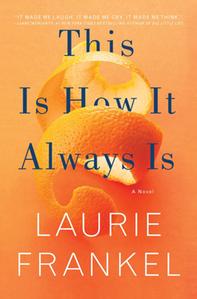
|
|
| photo: Natalia Dotto | |
Laurie Frankel writes novels, reads novels, teaches other people to write novels, and raises a small person who reads and would like someday to write novels in Seattle, Wash.
In Frankel's latest novel, This Is How It Always Is (Flatiron Books, reviewed below), the youngest of five boys decides he wants to be a girl, and his parents grapple with how to best raise their new daughter. In this funny, heartfelt book about growing up, Frankel shows that issues of gender are just as weird and just as normal as any other.
Where do you see This is How It Always Is in the larger struggle for transgender rights?
It's been keeping me up nights. I wrote the book for a [post-election] world that it is simply not being published in. I knew the book would be controversial, I knew it would p*ss people off. I knew it would be political. But I thought that the people it was going to p*ss off were going to be the fringe.
And now I'm thinking that less. I am profoundly grateful to do anything at all in the wake of this election to help this cause. But I am also terrified. I suppose the point of the book all along was to tell a good story with good characters, and people who don't necessarily understand--or haven't thought the issue all the way through, or don't have any personal experience themselves--would read it and be touched and compelled, and therefore make the world a better place for my kid. While also being entertained and amused. [Laughs] That's the goal going into a novel in general. And whether or not that's going to happen, I just do not know.
I feel like writing and reading are always political, in a now-more-than-ever kind of way. Even if the book weren't going to be controversial, that's where we are at the moment. More writing, more reading is another one of those "things we can do" in that desperate search for "things we can do."
You surround the central story with typical problems kids have growing up. Was the intent to show that Poppy's search for an identity should be considered just another basic narrative of adolescence?
Yes! The short answer is "this is how it always is." The very kernel of this idea was a metaphor. This is how parenting and how being a child always is. You have huge decisions, things that feel monumental and unique. But, in fact, all kids have them, and therefore all parents have them. There are decisions that seem like they can't be undone, but of course they can. You try something, and if it works, great, and if it doesn't, you try something else. I very much feel that kids that deal with any kind of gender nonconformity deal with it within the parameters of being kids. Kids are always facing issues with their identity, challenges growing up. This is part of that, a wonderful part of that. It should be celebrated.
But thinking of gender nonconformity as something totally aberrant, very unusual and dysfunctional is doing no good to anyone. In this country, a few months ago it was all about bathrooms, and schools accommodating transgendered students in bathrooms. And I just think, "This is what elementary schools do." They accommodate kids. They accommodate all sorts of craziness with kids. This is just another thing, and it doesn't have to be treated as this giant issue. Was there a moment you had with your own child that sparked the book?
Was there a moment you had with your own child that sparked the book?
I was starting the book as my kid was starting this exploration, this transition. It was not clear to me at the beginning necessarily that this was where it was going. So when I started the book, my author-ly imagination was thinking, "Oh, what if being trans was what this is," not really thinking that it was going to be [for my child]. But, being prepared for it, I was reading and researching.
You watch your kid grow up, and it is something that is endlessly fascinating to you, and not that fascinating to everybody else. In this particular case, suddenly it was. That was also a very strange experience.
The transgender stories we think of the most are TV shows like Transparent, where those transitioning are adults. You're presenting different view.
The idea of transgender kids is new. But transgender kids aren't new at all; we're acknowledging that these kids exist. The adults who are transgender were able to have blockers and hormones, if that's what they chose to do, as young adults. That's how long these treatments have been around. The conversation has changed completely. There isn't a model. There are not adults who have grown up the way these kids have grown up. Adults who are transgender have taken very different, and often much more painful, paths than our kids will have to take.
Poppy expresses that she wants to be a girl very strongly at the beginning, but later, she's in a place of deep confusion and doubt. It seems that you wanted to make sure it remained an ongoing conversation for her.
Yes. She's confused, but that doesn't mean that she's not one way or the other. There's a lot of doubt and fear and confusion on the part of everyone in this family. The parents want to support and protect their kid. But when supporting and protecting your kid become opposite things, which do you pick? It's basically an impossible question, and therefore an interesting one to write about. And it's one that is not going to be resolved in a chapter.
The other part of it is that kids grow and change, even transgender kids! Like anything else, transgender is a spectrum. Some of these kids will try it on for a while, then go back. Some of them will be gender nonconforming, rather than transgender per se. It's hard to know, because kids are growing and changing all the time. That's what we want--we want them to grow and change, to evolve and take in new information and process it in different ways. I do feel like I wanted to make that conversation a little more complicated.
Though it is really wonderful when parents embrace their gender nonconforming children, it also strikes me as necessary to leave some room, rather than going the route that Penn [the father] does, which is "let's just do this thing and get it over with. She'll be a girl, and that'll be the end of it." Well, no. It's more than that, it's better than that. We want to celebrate that, too, and not bury it or pretend it's not part of the transition. --Noah Cruickshank, marketing manager, Open Books, Chicago, Ill.

